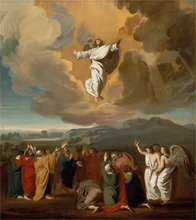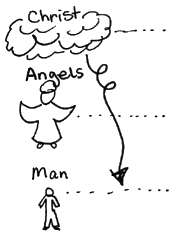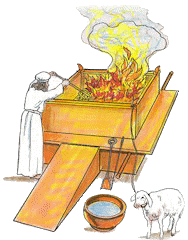Jesus is Inheriting God’s Authority, Give Heed to Jesus (Ch 2)
Segment Overview
Ch 2 about: Jesus put himself in our shoes and helps us with our struggles.
- Read Hebrews 2:1 (Remember Heb.2:1 starts a new segment)
- What is the first writing structure? Therefore
- What does this signal us? This verse is the effect of what was going on before
- What is the cause? the big idea from the prev segment, Christ >>> Angels
- What is the effect? We should give a more earnest heed to the things we have heard, lest we drift away.
- What things have we heard? Jesus is the son of God, to be revered more than the angels. (ie. the message of salvation thru Jesus Christ)
- What does earnest heed mean? pay close attention
- If we don’t give heed, what kinds of consequence are we to expect? drifting away from faith
- What kind of evidence was given to support this claim?
- Since the law (word spoken by the angels) offered such a strict punishment (“just reward”) for transgression/sin, how much more will we receive a “just reward” for neglecting the greater offer for salvation to all mankind? (2:2-3)
- This offer of salvation was: (2:3-4)
- spoken by God and confirmed by those who heard God
- testified to through signs, wonders, miracles, gifts of HS…
(ie. through the supernatural, not just through the word of man)
- The world to come is not going to be under subjection to the angels but Jesus, but for a short time Jesus became lower than the angels (mortal) and suffered death for all of us, and now is in the place of highest glory and honor (2:5-9)
- Jesus has the ability to release people from bondage , fear, and death (2:15)
Structural Laws
Segment 2 is characterized by having a lot of substantiation (evidence to support a statement that was previously said). Whenever we see a lot of substantiation that usually means either something is difficult to take or really important.
This segment begins with a therefore, indicating this segment is the effect of the previous segment.
Jesus = God’s Son, with power, higher than angels -> Give heed to the things we’ve heard <- Just reward for disobedience
 Give Earnest Heed…lest we drift away
Give Earnest Heed…lest we drift away
“Therefore we must give more earnest heed to the things we have heard, lest we drift away.” (2:1)
- What are the “things we have heard”? In the previous chapter, we heard things about Jesus, son of God, to be revered more than the angels.
- What is significant about taking “earnest heed”? It requires paying attention, listening, purposing in your heart, it’s a serious intention, not casual or lackadaisical.
- Implication: Likelihood if drifting away if we do not give heed: If we’re not regularly listening to and obeying God’s word, we’ll start to drift away from God.The world is quick to grab you and fill you with other thoughts that are not God.
Listen and obey God’s word
so that you don’t drift away.
 What does “drifting away” look like? You might not even notice you’re drifting, or how far you’ve gone until you’ve drifted a good distance. Drifting tends to be a careless or passive action, something that happens as a result of currents pushing us along and us not fighting back to resist the current. Drifting can be a great danger because it can be almost imperceptible as it happens. Drifting is something that happens when you are not anchored. To prevent this we need to be fully anchored in Christ. Do you have an anchor? Do you know how to use it?
What does “drifting away” look like? You might not even notice you’re drifting, or how far you’ve gone until you’ve drifted a good distance. Drifting tends to be a careless or passive action, something that happens as a result of currents pushing us along and us not fighting back to resist the current. Drifting can be a great danger because it can be almost imperceptible as it happens. Drifting is something that happens when you are not anchored. To prevent this we need to be fully anchored in Christ. Do you have an anchor? Do you know how to use it?
|
DANGER
|
|
 |
DRIFTING CAN KEEP YOU FROM ENTERING |
Where in this analogy is one drifting from and to? Drifting from truth, away from God, from a spiritual mindset into a carnal mindset. Drifting away from listening to God’s word.
Pastor Jon Courson points out the great risk that as mature Christians we can drift away because of: familiarity. We’re so familiar with the stories in the bible that we drift. He makes this point with an illustration from his experiences living near Disneyland:
When we lived near Disneyland, I went there a lot. The first time I went, it was magical. The second time it was intriguing. The third time, it was exciting. And the fourth time was wonderful. The fifth time was fine. And the sixth time was okay. But after the tenth, twenty-fifth, and thirty-ninth time, I finally said, “I’ve been on the submarine ride a lot. I know every twist and turn of the Matterhorn; I could give you the jungle cruise spiel verbatim.” Now, at that point, if someone asked me if I liked the magic kingdom, I would say, “Sure. Go. Its great.” But if you asked me if I would come along, I’d say, “No thanks–but you should go!”
The same is true in the area of Bible study or any other area of spirituality. Whenever we’ve seen the sights of Genesis, or strolled the streets of Matthew, we can say “I don’t need to go to Bible study, I know the stories; I’ve heard the applications.” And not taking earnest heed untp the Word, we can drift away imperceptibly until you get to the falls wondering how we got there.
And then he shared a story about a friend inviting him to a group dinner at Walt Disney’s private dining room. And how that refreshed his excitement with Disneyland. New experiences in the same place.
[What makes the devotions come alive, and makes church services meaningful, even after all these years is that] I get to talk to the King as the message unfolds; I get to ask forgiveness as I am convicted; I get to give thanks for grace and mercy as I am instructed. [What keeps us coming back is] not ritual–but relationship; not cruising through the kingdom, but talking to the King.
Another note about 2:1, When a sentance in the bible begins with “therefore” and the following verse begins with “For”, its usually an important point. In this case, verse 2:1 is not only important, but the primary “point” of this segment. Each paragraph begins with additional “For” statements, adding evidence and support to the point he’s making. What’s the point? Jesus is greater than the angels, so we need to take heed and not neglect Jesus.
 “For if the word spoken through angels proved steadfast, and every transgression and disobedience received a just reward” (2:2)
“For if the word spoken through angels proved steadfast, and every transgression and disobedience received a just reward” (2:2)
What was the “word spoken through angels”? The jewish law
What is a “just reward” for “transgression and disobedience”? Punishment. Jewish law was very strict with punishments for breaches of the law. Infidelity, for example, was punishable by death. God’s justice was strict and the law steadfast and sure, punishment was due for their sin.
“When and angel brought a message, you could depend on its being carried out just as it was stated.” (McGee) Example: When the angel at Sodom came with the announcement of Sodom’s impending destruction, the destruction was carried out exactly as the angel had said it would.
“how shall we escape if we neglect so great a salvation…” (2:3a)
How else could we escape God’s wrath and the punishment due for our sins by the law? It’s somewhat of a rhetorical question as there is no other way to escape the punishment due because of our sin. And by calling it “so great” Paul is really making a point about how important he thinks it is, it isn’t just an “okay” salvation or a “pretty great” salvation, but SO great.
“…which at the first began to be spoken by the Lord…” (2:3b)
What was spoken by the Lord? The great offer of salvation through Jesus.
Its also interesting to note that there’s a subtle contrast and progression being presented in 2:2-3: The law was spoken by angels, now salvation is being spoken by God, who is of a higher authority than the angels.
|
What…
|
Was Spoken By…
|
Authority Level | |
| Then… |
The Law
|
Angels
|
+++ |
| But now… |
Salvation
|
God
|
+++++ |
| If Jesus is greater than the angels, what does this contrast imply about how we should react to his offer of salvation? |
“and was confirmed to us by those who heard him, God also bearing witness both with signs and wonders, with various miracles, and gifts of the Holy Spirit, according to his own will? (2:3c-4)
Now Paul shares with us additional supporting evidence. Not only did God speak about this great salvation, those who heard him confirmed it, and God also bore witness through miracles, signs and wonders, and gifts of the holy spirit. You really should be convinced at this point.
| Through | Example |
|
Signs & Wonders
|
Parting of the Red Sea & Jordan |
|
Miracles
|
Many Healed (Acts 4:22) |
|
Gifts of the Holy Spirit
|
The Day of Pentecost (eg: speaking in tongues) |
God bears witness through: signs, wonders, miracles, gifts of the H.S. If you aren’t stepping out in faith you might not see these things?
The Son’s Authority: Superior to the Angels
Now the focus changes slightly, before the author was talking about Christ’s deity (divine nature), but now the author addresses Christ’s humanity (human nature). “He brought deity down to this earth, and He took humanity back to heaven” (McGee).
 “For He has not put the world to come, of which we speak, in subjection to the angels.” (2:5)
“For He has not put the world to come, of which we speak, in subjection to the angels.” (2:5)
What is the “world to come”? Although it is tempting to interpret the “world to come” as the heaven spoken of in revelation, most commentaries agree that it implies the world under the Messiah, NOT heaven. Why do they suggest that? Because the greek word oikoumene (οἰκουμένη) [Strongs G3625] in every other context its used is relating to this world, where changing the meaning to heaven would not make sense. For example, look at Matthew 24:14, “And this gospel of the kingdom will be preached in all the world as a witness to all the nations, and then the end will come.” Clearly, world in that context could not refer to the new earth spoken of in Revelation. There are other greek words that Paul could and would have used in connection to heaven and/or the “new earth” of Revelation if that’s what he really meant. As further evidence, the helper word mello (μέλλω) [Strongs G3195], the word which implies the future tense “to come” in this verse is also used later on in Heb. 10:1. “The law, having a shadow of the good things to come…” From context we know the author is contrasting living under the Law to living under Christ. He is not talking about comparing the law to heaven.
Who has he put the world to come in subjection to? Not the angels, but Christ. Again, this is evidence of Christ’s superiority to the angels. Neither this world, nor the one to come is in subjection to the Angels.
Basis for the Son’s Authority (2:6-9)
In these three verses we see something interesting, the author is providing his own commentary on some scripture he quotes.
“But one testified in a certain place saying…” (2:6a)
Who is the One spoken of here? David. We know this because the scripture quoted in the rest of this verse (Ps. 8:4-6) is credited as a Psalm of David. The psalm quoted tells us who the world to come will be in subjection to, the Son of God who was for a time made lower than the angels, but who was crowned with glory and honor, and all he was set over all the works of God’s hands.
IVP asserts that saying “one testified” is a way of expressing confidence that the words quoted were inspired by God, and in no way implies the author was trying to circumlocute around a forgotten verse reference.
“…‘What is man that You are mindful of him, Or the son of man that You take care of him?” (2:6b)
Saying “What is man?” implies insignificance of man. J Vernon McGee illustrates this with a quotation–“Man is a rash on the epidermis of a minor planet”. why does God take care of people?
“You have made him a little lower than the angels; You have crowned him with glory and honor, And set him over the works of Your hands.’ ” (2:7)

 Many bibles have a footnote on this verse or verse 9 to explain that in greek, little can be translated either in the context of referring to size or time, in this case, a good translation would probably be that He was made lower than the angles for a brief (or little) time. In the scope of all eternity, 33 years certainly is a brief period of time.
Many bibles have a footnote on this verse or verse 9 to explain that in greek, little can be translated either in the context of referring to size or time, in this case, a good translation would probably be that He was made lower than the angles for a brief (or little) time. In the scope of all eternity, 33 years certainly is a brief period of time.
little = a quantity of size or time.
Notice the repetition of these ideas between this verse and Hebrews 2:9:
|
Heb 2:7
|
Heb 2:9
|
| You have made him a little lower than the angels; | But we see Jesus, who was made a little lower than the angels, |
| You have crowned him with glory and honor, | for the suffering of death crowned with glory and honor, |
| And set him over the works of Your hands. | that He, by the grace of God, might taste death for everyone. |
 What is interesting about Jesus being crowned with glory and honor? Man “crowned” Jesus with thorns. God crowned Jesus nearly the opposite, glory and honor, much unlike the humiliation on the cross.
What is interesting about Jesus being crowned with glory and honor? Man “crowned” Jesus with thorns. God crowned Jesus nearly the opposite, glory and honor, much unlike the humiliation on the cross.
What is interesting about God setting Jesus over the works of His hands? God is the one elevating Jesus and giving him a position of authority.
God is the one who gives true
glory, honor, and authority.
You have put all things in subjection under his feet” (2:8a)
Whose feet is “His” referring to? That of Christ, not man. Who is “You”? God, the father.
“…now we do not yet see all things put under him, but we see Jesus…” (2:8b-9a)”
A contrast is presented:
|
|
But… |
|
|
|
Everything under
Jesus already (requires faith) |
Jesus
|
What we don’t see? Jesus ruling the earth today. The earth, mind you, has not slipped out of God’s control, but he’s not ruling it today. Who is ruling it? The “prince of this world” (Satan) and mankind are attempting to, but much like when Lucifer, an angel, decided he wanted to rule, it just doesn’t “work”, angels were not created to rule, but to be God’s messengers; mankind was not created to rule either. What were we created to do?
What do we see? Jesus. Why did the author use the name Jesus instead of the name Christ in this instance? The name Jesus is associated with His earthly human appearance, that is what we can see. In contrast, Paul could have chosen the title Christ, which would imply a bit more of his heavenly nature.
 “…who was made a little lower than the the angels, for the suffering of death crowned with glory and honor, that He by the grace of God, might taste death for everyone.” (2:9c)
“…who was made a little lower than the the angels, for the suffering of death crowned with glory and honor, that He by the grace of God, might taste death for everyone.” (2:9c)
Tasting Death: Calamity and sorrow are often represented in the bible through a metaphor of “drinking a cup of woes” (Barnes), giving imagry of a drink that tastes bitter or unpalatable. It is the same metaphor referred to in verses like Matthew 26:29, where Jesus says ‘let this cup pass from me’.
Jesus’s death brought glory and honor to the person of Christ, as well as procuring man’s salvation. By him tasting death, we can taste life.
Bringing Many Sons to Glory
In these verses we see a theme that the Son is superior to the angels in his perfect humanity and his conquest of sin and death.
“For it was fiting for Him…to make the author of their salvation perfect through sufferings” (2:10)
- Fitting = fits the mold, qualified
- Author = archegos in Greek. This word could be translated as author, pioneer, captain, or leader. It implies “someone who initiates or originates a plan or program for others to follow” (Steadman). Just as Lewis and Clark were pioneers of the (American) West prior to development in those areas, Jesus is a pioneer opening up new spiritual territory.
- Perfect = complete.
| Perfection through Suffering |
| Jesus became perfect through suffering. What does that say about how us, created in the image of God, being made perfect? What does that say about the necessity of suffering? It is “fitting” that to be made perfect requires suffering. Suffering gives God an opportunity to perfect us.
One possible way God might use suffering in our lives: Suffering so that others might watch us stand firm through suffering. |
What purpose does it serve to include the detail “for whom are all things and by whom are all things”? A reminder that God created everything, that he’s a supreme and sovereign ruler, the beginning of all things and the end of all things.
Union of the Redeemer and the Redeemed
11 For both He who sanctifies and those who are sanctified are all from one Father; for which reason He is not ashamed to call them brethren, 12 saying, “I will proclaim Your name to My brethren, in the midst of the congregation I will sing Your praise.” 13 And again, “I will put My trust in Him.” And again, “Behold, I and the children whom God has given Me.”
- sanctified = to be made holy. Sanctification is not a condition, but a position we have in Christ (McGee).
- of One = all these things are of God.
- brethren = brother(s). Jesus is the firstborn son of God, of whom we are made brothers, made sons of God.
| Are you living like Jesus is your brother? |
In verses 12-13, the author quotes 3 more old testament scriptures (from Psalms and Isaiah), as evidence that what he’s saying about Jesus (being the Messiah whom we should follow and respect) is inspired by God and evidenced in the scriptures of which the Jewish audience trusted the authority.
I = Jesus. Who would brethren refer to? Those adopted into the family of Christ (believers), perhaps the Jewish audience receiving this letter.
“In the midst of the assembly I will praise to You ” (2:12b)
Assembly could also be translated congregation. This appears to be describing a fellowship with God…God is in the mindset of us as a congregation singing praises to the Lord.
Also interesting, He has all authority on earth, but Christ still glorifies the father…he’s not above doing that.
2:13“And again: ‘I will put My trust in Him.’ And again ‘Here am I and the children whom God has given me’. ”
Why does he keep quoting again and again? Showing a pattern of language about the Messiah in the OT. What are the connotations of placing trust in Him? Dependence on God, and confidence in God.
The verse quoted, in its original context this verse appeared to refer to the sons of Isaiah. But here it is being used to refer to Christ. How does that work? Both Unger and McGee appear to agree that its because the Holy Spirit interprets the scripture. As Unger explains it, “…(Isa 8:18) actually refers to Isaiah’s two sons, but is here, 13b, applied by the Holy Spirit to represent the unity of the Son with His brethren. The angels do not sustain such unity with the redeemed; such uniquely belongs to the perfect man, the Redeemer.”
Conquest of Sin and Death
 “Inasmuch then as the children have partaken of flesh and blood, He Himself likewise shared in the same, that through death He might destroy him who had the power of death, that is, the devil” (2:14)
“Inasmuch then as the children have partaken of flesh and blood, He Himself likewise shared in the same, that through death He might destroy him who had the power of death, that is, the devil” (2:14)
Inasmuch then = since or because [Greek: epei G1893]
partaken = participated in, shared in [Greek: koinoneo G2841]
destroy = render powerless, nullify, bring to an end [Greek: katargeo G2673]
What does it mean to partake in flesh and blood? To have a human rather than angelic nature, be a part of humanity.
Who are the “children” parking in this? Commentaries suggest that based on the context, it refers to those adopted into the family of God, ie. believers.
Who is He Himself? God (we can infer from context that it means specifically the Son, Jesus, but the verse appears more to be emphasizing his supreme nature as a part of the trinity).
What does it mean for God to “share in the same”? God came in the flesh as Jesus, participating in human nature. Communion.
What might be significant about Jesus dying? God in his divine nature can’t die. Angels don’t die. This could be implying something both about why Jesus didn’t come an angel (remember this whole segment has a theme about Jesus being superior to the angels) and why He would assume a form “less than” the angels for a short time.
Who is the one who previously had “the power of death”? The Devil.
What do we learn about the devil from this verse? The devil has the power of death, but Jesus dying overcomes the devil, and brings an end to the devil and his power. He isn’t so much physically destroyed so much as his power destroyed, brought out from under the dominion of the Devil and under the subjection of Jesus.
Satan has been rendered powerless
through the death of Jesus.
Another way of saying this verse might be: “Since these children are people with physical bodies, Jesus himself became like them. He did this so that, by dying, he could destroy the one who has the power of death–the devil” (Heb 2:14, NCV)

Diabolos: The Devil – What Greek word is used for “devil”, where else is this word used? diabolos [Strongs G1228], from the sum or its word root parts, it means slanderer or “to hurl across/through” (English related word: diabolical). Doesn’t this give an interesting mental picture of what the devil does? It is the same word devil as is used in Matthew in the context of the temptation of Jesus in the wilderness by the devil. Although the vast majority of the time the word is translated as devil, in a couple place it is also used in commands to people not be “false accusers” or slanderers (eg Titus 2:3). In this case, it literally means the devil.
“and release those who through fear of death were all their lifetime subject to bondage.” (2:15)

bondage = slavery, bondage, the condition of a slave [Greek: douleia G1397] In Romans 8:15 the same word is used to contrast a spirit of adoption from a spirit of bondage.
Not only were we delivered from death, but also delivered from the fear of death. Fear and bondage seem to be frequently tied together in the bible. Jesus’s death frees us from bondage.
“For indeed He does not give aid to angels, but He does give aid to the seed of Abraham.” (2:16)
What does seed of Abraham mean? The offspring or descendants of Abraham. God promised Abraham’s descendents would become a great (large) nattion, and God promised blessing to them (Gen. 12:1-3). The greek word here translated as seed is literally sperma from which we derive the English word sperm.
|
|
But… |
|
|
|
To the Angels
|
To the Seed of Abraham
|
Made Like His Brethren
“Therefore in all things He had to be made like His brethren, that He might be a merciful and faithful High Priest in things pertaining to God, to make propitiation for the sins of the people.” (2:17)
In this verse, Therefore = Greek: Hothen 3606, on which account, for this reason. This is the first time in Hebrews we’ve encountered this particular Greek word for therefore, rather than more common words used as therefore like oun [G3767] or dia [G1223]. In KJV, hothen is usually translated as the archaic English words wherefore or whence, never therefore (some of the other words of similar meaning are translated as either therefore or wherefore). Modern English translations leave this distinction obscured, unless you consult a lexicon. Interestingly, 6 of the 15 appearances of hothen in the bible are in Hebrews.
frequently in Hebrews than anywhere else in the New Testament? |
|
Hothen (Wherefore) In Hebrews (NASB)
|
| Heb 2:17 – Therefore, He had to be made like His brethren in all things, so that He might become a merciful and faithful high priest in things pertaining to God, to make propitiation for the sins of the people. Heb 3:1 – Therefore, holy brethren, partakers of a heavenly calling, consider Jesus, the Apostle and High Priest of our confession; Heb 7:25 – Therefore He is able also to save forever those who draw near to God through Him, since He always lives to make intercession for them. Heb 8:3 – For every high priest is appointed to offer both gifts and sacrifices; so it is necessary that this high priest also have something to offer. Heb 9:18 – Therefore even the first covenant was not inaugurated without blood. Heb 11:19 – He considered that God is able to raise people even from the dead, from which he also received him back as a type. |
 What characteristics are being ascribed to Jesus here? Merciful, faithful, a High Priest, able to make propitiation for people’s sins.
What characteristics are being ascribed to Jesus here? Merciful, faithful, a High Priest, able to make propitiation for people’s sins.
Merciful – Full of mercy (not inflicing deserved punishment). “benevolently merciful”. Shows compassion on those suffering. The Mercy Seat in the holy of holies was the only place in the OT that atonement was able to be made (and only on an annual day set apart for this). Mercy seems to therefore be a requirement for atonement.
Faithful – Able to be trusted, true to his word. Unswerving adherence. God is faithful in fulfilling his own promises.
Being made in the image of God, we should reflect
and imitate God’s Faithfulness and Mercy.
The idea that Jesus is our everlasting high priest is a major theme in Hebrews. The term high priest [archiereus, G749] appears 17 times in Hebrews. Outside of Hebrews, the only places it appears in the New Testament are in the Gospels and Acts. The idea is Jesus is superceding the high priests from the Old Covenant. What is the role of a High Priest? The role of a chief priest or high priest was introduced in the days of Moses (in Exodus), as they embarked on the journey to the promised land. The high priest was to be a chief or leader over all the other priests (does this remind you of archegos meaning captain or leader from Heb. 2:10?). Special responsibilities included being a mediator between God and man and making atonement for the sins of the people. In the OT this was usually done annually on the Day of Atonement after very specific rituals and sacrifices were followed, but in the NT, Christ made atonement once for the rest of eternity. The office of high priest was hereditary and given for life, beginning with the nephew of Moses.
What is the role of a High Priest? The role of a chief priest or high priest was introduced in the days of Moses (in Exodus), as they embarked on the journey to the promised land. The high priest was to be a chief or leader over all the other priests (does this remind you of archegos meaning captain or leader from Heb. 2:10?). Special responsibilities included being a mediator between God and man and making atonement for the sins of the people. In the OT this was usually done annually on the Day of Atonement after very specific rituals and sacrifices were followed, but in the NT, Christ made atonement once for the rest of eternity. The office of high priest was hereditary and given for life, beginning with the nephew of Moses.
Propitiation – an atoning sacrifice appeasing the wrath of God.
Sins – from an archery term meaning to miss the mark or fall short.
In the old covenant, sins were confessed and symbolically transferred to a sacrificial animal, on which hands were laid and then killed and the blood offered up by the priests (Lev 1). This atonement (propitiation) covered over the sin itself, but did not remove the guilty conscience, thus requiring repetition frequently (we’ll get to talking about how Christ removes the guilty conscience part more later).
“For in that He Himself has suffered, being tempted, He is able to aid those who are tempted.” (2:18)
Because Jesus endured temptation and testing, he is able to have compassion on and help those who are experiencing the same.
The flag-word “For” [Greek: gar G1063] is used to assign a reason. What is this verse then explaining? How Jesus being made like his brethren in all things makes him a faithful high priest for us.
 Tempted – to test or try (but is morally neutral) [Greek: Peirazo G3984]
Tempted – to test or try (but is morally neutral) [Greek: Peirazo G3984]
Precept Austin maintains that this word is derived from two word roots: “from the noun peira = test [and] from peíro = perforate, pierce through to test durability of things”. This greek case for this word is Aorist Passive Participle. What does that mean? The subject of the sentence, Jesus, is being acted upon by temptation, and it happened either in the past (the tempting is a completed action) or that it must happen in time before the infinitive (main) verb in the sentence occurs (ie: taking place before he is able).
Interpretation: Jesus suffered temptation so he can help others who are tempted. Our past suffering enables us to help those suffering temptation. When you suffer remember God is going to use it for good (eg. help other people suffering from the same struggle).
Experiencing temptation allows us to
later aid others who are also tempted.
Aside on Temptation: How did Jesus deal with temptation? He cried out to God (Matthew 27:46), turned to God and God’s word (Matthew 4:4). What does the bible say about how we shouldn’t deal with tempation? Complaining (Philippians 2:14). We always have a choice about whether we focus on and glorify God’s goodness or focus on our circumstance that is tempting us.
God wants us to cry out to him
rather than complain to the world.
| Do we glorify God’s goodness, or focus on circumstance? |
Suffered – To be affected, feel or undergo (usually painful) [Greek: pascho G3958]. It is interesting that Thayer associates both a positive and negative connotation with this greek word, to be well off vs to suffer–indicating perhaps that suffering is not a bad thing in and of itself even though its painful. That interpretation would be consistent with how James 1:2-4 describes the positive outcome of trials). The verb tense of suffered is “second perfect”. Perfect tense indicates past actions with effects that continue into the present/future. Interpretation: The effect of Christ’s suffering continues into the present and future.
able – having the power or ability [Greek: dunamai G1410] In this case it indicates not that Jesus has suddenly acquired a power to help, but that he is now qualified to help those in need (Barnes). The present indicative tense tells us this ability is continuing in the present. Jesus is continually able to help those in need, it is a characteristic of Jesus that is always true. This message of helping those that are tempted would be particularly apt for those Jewish Chrisitans who were being tempted to give up Christ and return to the old covenant.
